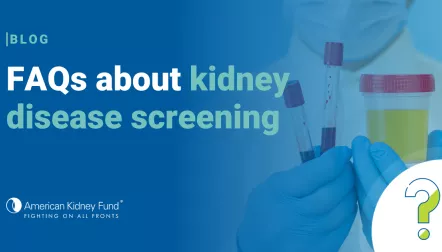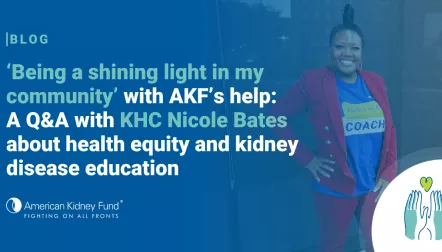
Blog post
Patient voices were the driving force behind AKF's Unknown Causes of Kidney Disease Summit

Earlier this month, the American Kidney Fund (AKF) hosted the Unknown Causes of Kidney Disease Summit to improve understanding of how undiagnosed or misdiagnosed causes of kidney disease directly impact patient care and outcomes. AKF brought together leaders in the medical, research, academic and patient advocacy spaces for this first-of-its-kind event in the kidney disease community.
Among patients who receive treatment-related financial assistance from AKF, AKF's data shows that a patient who does not know the cause of their kidney disease is more likely to be lower-income, have less in savings and more likely to have lost a kidney transplant. If someone's kidney disease was caused by an undiagnosed rare disease that has a genetic link, there is potential for multiple family members to also be affected.
The Summit's most powerful moments put a spotlight on the main reason the kidney community came together to address this serious issue in nephrology: patients.
Shayla Harris
Shayla Harris is a former Division I college athlete who was always in shape. When she was in her 20s, she was feeling great and had no health issues that would indicate that anything was wrong with her body. She went to her primary care doctor for her annual physical one year with only one concern — her feet had become so swollen she could not comfortably fit them inside her shoes. The doctor ran some blood work and informed Shayla that she had kidney disease.
Unknown to her, Shayla's "creatinine levels were extremely high and [her] protein levels were even higher." She was sent to a nephrologist, without a full understanding of what that type of doctor even treats. The nephrologist ran some additional blood work and performed a kidney biopsy, which showed that her kidneys were only functioning at 10-15%. She was told that she would eventually need dialysis or a kidney transplant to live. "That was a total shock to my family and I," Shayla recalled during the Summit.
"The toll that kidney disease took on my life was great. I was extremely fatigued and had to take medication that I never had to take before," Shayla told Summit participants. She and her nephrologist decided it was time to begin looking for a living kidney donor. Her nephrologist suggested that she begin her search for a living donor with her two younger sisters — something Shayla was uneasy about as the big sister.
She started her search with her middle sister, Ivy, who stepped up to the plate and became Shayla's donor. Calling Ivy her "superhero," Shayla told Summit participants, "the fact that she gave me that gift of life [meant] I was able to continue on with my life." Shayla received her new kidney from Ivy on February 24, 2010 — her "second birthday" — and is more than 10 years post-transplant now. She still does not know what caused her kidney disease.
Motivated by her two sons, Shayla is now on a journey to find out what caused her kidney disease. She wants to make sure "there's never a point in their lives where [everything] stops, like kidney disease stopped me." Part of that journey includes participating in a focal segmental glomerulosclerosis (FSGS) gene research study with Dr. Martin Pollack, one of the presenters at the Summit, in hopes of finding an answer to what caused her kidneys to fail.
In addition to fighting for herself and her family, Shayla is "honored to be a voice for the 37 million Americans with kidney disease, and even more proud to be a voice for those who still to do this day don't know what happened to them" and are as curious as she is to find out. She is also an AKF employee.
Paul Rakoski
Paul's health issues began when he was a child. He told Summit participants that he remembers not sweating much at all when he was a kid and wrongly being diagnosed with dairy intolerance as a teenager after he went to the doctor with stomach issues — a symptom he shares with his mother. He continued on with his life, not realizing that both symptoms were related to each other and to a larger problem.
As Paul got older, he developed chronic back pain. He was encouraged by his wife one day to go to the doctor to get an MRI, which he did. The MRI did not reveal any back problems, but it did show cysts on his kidneys. The MRI, combined with blood work that showed his creatinine level was higher than normal, led to a referral to a nephrologist and a diagnosis of polycystic kidney disease (PKD).
Paul began being treated under the impression that he had PKD but at the urging of his wife, he went for a second opinion. After additional tests and getting know Paul as a patient, his nephrologist determined that PKD was not causing his kidney disease. After a journey of trying to figure out what caused his kidney problems, Paul eventually learned that he has Fabry disease, a rare genetic disorder that can damage the kidneys, heart and brain. Some of the other symptoms of Fabry disease include not sweating, gastrointestinal issues and cold and heat intolerance that can be very painful.
Paul told Summit participants that he was "fortunate" to meet with a genetic counselor within a few weeks of his Fabry diagnosis because he was able to learn all about the disease's genetic link. He told his family about his diagnosis and encouraged them to get tested. Numerous family members were tested, and his mother, sister and two of his sister's children all learned that they are also living with Fabry disease.
As Paul's kidney disease progressed to kidney failure, he was encouraged to search for a living donor. He asked family, but the number of family members who could potentially donate a kidney was reduced because those who also have Fabry disease could not donate to him. Paul received a kidney from a friend who wanted to give back after losing her mother to cancer. He has had his kidney transplant for one year, to the day, longer than Shayla.
Paul wishes he had received the correct diagnosis a lot sooner and that the first doctor did a lot more to look into what caused his kidney disease. "The doctor just looked at the MRI and blood work and said I had PKD based on just one image," he said at the Summit. Though he and his wife do not have children, he believes that if doctors caught Fabry disease in him or one of his family members earlier, it would have given his sister the opportunity to know that she had it before unknowingly passing it onto two of her children.
Kevin Schnurr
When Kevin was a child, doctors found that he had a tiny amount of blood in his urine that was so small, it could only be seen under a microscope — a medical condition called microhematuria. He and his mother, who also has the same issue, were told that it was nothing to worry about. He did not have any other significant health issues until his mid-20s, when he began losing his hearing. He figured his hearing loss was caused by the loud music he always listened to at his radio station job and the loud concerts he frequently attended.
In 2012, he went urgent care with flu-like symptoms. Urgent care told him he needed to go to the emergency room immediately because his blood pressure was extremely high. At the hospital, blood samples showed that Kevin had high potassium and was in kidney failure. He was placed on emergency dialysis and was told that if he was not 26 and otherwise healthy, he probably would have had a heart attack or stroke. He had no idea there was anything wrong with his kidneys until that day.
Kevin was eventually diagnosed with Alport syndrome, a rare genetic disease that always causes kidney disease and can also cause hearing loss, eye problems and blood in the urine that can only be seen under a microscope. He began peritoneal dialysis at home and the search to find a kidney donor.
Kevin's friend, Matt, wanted to donate a kidney to Kevin but his job had a very demanding schedule that did not easily allow him to take time off for organ donation surgery. Luckily, Matt's boss is well aware of how important organ donation surgery is — she is living with a kidney transplant herself. She was very accommodating, and Matt was able to take time off from work to donate his kidney to Kevin in 2014.
After being diagnosed with Alport syndrome, Kevin changed careers completely and is now the Director of Communications and Patient Engagement at the Alport Syndrome Foundation. He is disappointed that his doctors wrote off his earlier symptoms and did not "put two and two together" to realize everything might be connected. He noted during the Summit that misdiagnosis or a lack of diagnosis is common for those with a rare disease. In addition to calling for more physician education, Kevin advocates for more frequent and earlier testing of potential symptoms of kidney disease in children, including simple urine dipstick testing, which for some "could make the difference between being diagnosed at age three vs. 33." He told Summit participants that he hopes to prevent other people from being thrown into a kidney failure situation with no time to adequately plan or cope, like he was.
The Unknown Causes of Kidney Disease Summit was made possible with generous funding from our Leadership Sponsors Natera, Otsuka America Pharmaceutical, Inc., Sanofi Genzyme, and Vertex Pharmaceuticals Incorporated, our Champion Sponsor Alexion Pharmaceuticals, and our Supporting Sponsor Travere Therapeutics, Inc.





